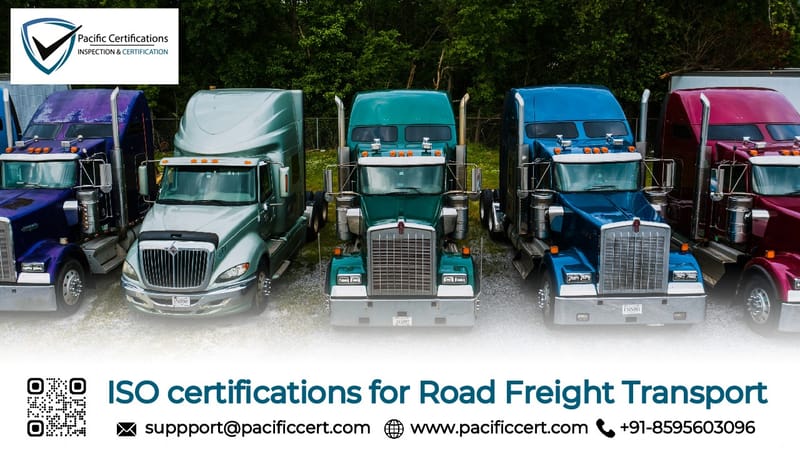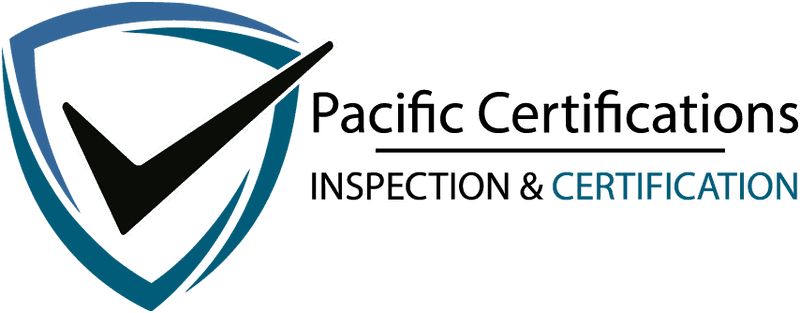ISO Certifications for Road Freight Transport Services, Requirements and Benefits

Road freight transport plays a critical role in global supply chains, ensuring the movement of goods across cities, states, and countries. The efficiency and safety of road freight transport directly impact the economy and operational costs. To maintain high standards of operation and ensure compliance with regulations, road freight transport companies can benefit from obtaining ISO certifications.
ISO standards provide frameworks that ensure quality, safety and efficient management within organizations. For the road transport sector, ISO certifications help enhance service reliability, improve processes, reduce risks, and ensure customer trust.
If your Road Freight Transport business is ready to enhance its operations with ISO certification, contact us at [email protected] or call +91-8595603096 for expert audit and certification services.
Applicable ISO Standards for Road Freight Transport
There are several ISO standards applicable to the road freight transport sector. Below are the most relevant ISO standards for road freight companies:
ISO 9001:2015 – Quality Management Systems (QMS)
ISO 9001 is the world’s most widely adopted quality management standard. It ensures that companies implement a systematic approach to managing their operations, focusing on customer satisfaction, continuous improvement, and meeting regulatory requirements.
ISO 14001:2015 – Environmental Management Systems (EMS)
ISO 14001 helps organizations reduce their carbon footprint and comply with environmental regulations. This standard provides a framework for identifying and managing environmental aspects such as fuel consumption, emissions and waste management.
ISO 45001:2018 – Occupational Health and Safety Management Systems (OHSMS)
Road freight transport involves risks associated with vehicle operation, loading, and unloading. ISO 45001 helps companies protect their employees by establishing a management system focused on reducing workplace injuries and illnesses.
ISO 39001:2012 – Road Traffic Safety Management Systems (RTSMS)
ISO 39001 focuses specifically on road traffic safety. It provides a systematic approach to managing road traffic risks, helping transport companies reduce accidents and fatalities.
ISO 27001:2022 – Information Security Management Systems (ISMS)
ISO 27001 helps road freight companies protect sensitive customer information, transportation details, and business data from cybersecurity threats. This standard establishes a comprehensive framework to mitigate risks related to information breaches, ensuring business continuity.
Click here to find out more applicable standards to your industry
Looking to improve quality, safety, and environmental management in your Road Freight Transport operations? Reach out to us at [email protected] or call +91-8595603096 to start your ISO certification journey.
How We Can Help
At Pacific Certifications, we specialize in auditing and certifying businesses across various industries, including road freight transport. As an accredited certification body, we can assist companies with obtaining ISO certifications by providing comprehensive audit services and ensuring compliance with ISO standards.
However, it is important to note that we do not offer consultancy, gap analysis, training, or implementation services—our role is solely focused on the audit and certification process.
Through our expertise, we ensure that your road freight transport business meets the requirements of ISO standards, giving you an edge in operational efficiency, customer satisfaction, and regulatory compliance.
Whether you are seeking certification for ISO 9001, ISO 14001, ISO 45001 or others, we are here to guide you through the certification journey and help you achieve global recognition for your commitment to quality, safety, and environmental sustainability.
Elevate your Road Freight Transport services with ISO certifications. Contact Pacific Certifications at [email protected] or call +91-8595603096 to get certified today.
Requirements of ISO Standards for Road Freight Transport
The requirements of each ISO standard are designed to provide organizations with frameworks to improve their management systems and overall performance. Below is an overview of the key requirements for each of the mentioned ISO standards:
ISO 9001:2015 – Quality Management Systems (QMS)
- Context of the Organization: Understand the internal and external factors that affect the organization and its ability to achieve the intended outcomes of the QMS.
- Leadership: Top management must demonstrate leadership and commitment to the QMS by establishing a quality policy, objectives, and roles and responsibilities.
- Planning: Identify risks and opportunities, set quality objectives, and plan actions to address risks and opportunities.
- Support: Ensure resources, including competent personnel, infrastructure, and an organizational environment that supports quality. This also involves controlling documented information.
- Operation: Plan, implement, and control processes to meet the requirements for products and services, including design, production, and service provision.
- Performance Evaluation: Monitor, measure, analyze, and evaluate the performance of the QMS, including conducting internal audits and management reviews.
- Improvement: Take actions to address non-conformities and implement continuous improvement processes to enhance the QMS and overall performance.
ISO 14001:2015 – Environmental Management Systems (EMS)
- Environmental Policy: Establish a policy that commits to environmental protection, compliance with regulations, and continuous improvement.
- Planning: Identify environmental aspects, assess their impact, and plan actions to mitigate negative impacts. This includes setting environmental objectives and considering risks and opportunities.
- Support: Allocate resources and ensure that employees are competent, aware, and capable of fulfilling their roles. This also includes internal and external communication of the EMS.
- Operational Control: Implement processes to manage environmental aspects, including emergency preparedness and response, product life-cycle analysis, and waste management.
- Evaluation of Compliance: Regularly evaluate compliance with legal and other environmental requirements, and assess the effectiveness of the EMS.
- Monitoring and Measurement: Monitor environmental performance, measure progress towards environmental objectives, and analyze performance to drive improvement.
- Improvement: Take corrective actions to address non-conformities and implement continual improvements in environmental performance.
ISO 45001:2018 – Occupational Health and Safety Management Systems (OHSMS)
- Leadership and Worker Participation: Top management must lead the OHSMS and ensure worker participation in the safety process.
- Hazard Identification and Risk Assessment: Identify hazards, assess risks, and determine opportunities for improving occupational health and safety.
- Objectives and Planning: Set OHS objectives, and develop action plans to mitigate risks and improve workplace safety.
- Operational Controls: Implement procedures for the control of occupational health and safety risks, including emergency preparedness and response.
- Monitoring and Measuring: Regularly evaluate the organization’s health and safety performance, including compliance with legal requirements and internal standards.
- Incident Investigation: Report and investigate incidents, and take actions to prevent recurrence.
- Continual Improvement: Implement corrective and preventive actions to address non-conformities and improve overall health and safety performance.
Each of these ISO standards requires an organization-wide commitment to compliance, continuous improvement, and risk management. Meeting these requirements helps organizations in freight transport and other industries reduce risks and achieve long-term success through certification.
Ready to achieve ISO certification for your Road Freight Transport company? Contact us at [email protected] or give us a call at +91-8595603096 for a seamless audit and certification process.
Benefits of ISO Standards for Road Freight Transport
The benefits of adopting ISO standards are numerous and vary depending on the specific focus of the standard. Below is an outline of the benefits associated with the key ISO standards:
- ISO 9001 helps organizations deliver consistent quality in their products and services, leading to higher customer satisfaction and loyalty.
- ISO 9001 certification is recognized globally and can open doors to new markets and business opportunities
- ISO 14001 helps organizations systematically identify and manage their environmental aspects, such as emissions, waste, and resource consumption.
- ISO 45001 helps organizations create a safer working environment by identifying and controlling occupational hazards.
- ISO 39001 helps organizations systematically manage road traffic safety risks, leading to a reduction in road traffic accidents, injuries, and fatalities.
- ISO 27001 provides a systematic approach to managing sensitive information
- ISO certifications are internationally recognized, providing companies in enhancing credibility in global markets.
- All the ISO standards focus on identifying, assessing, and mitigating risks, whether related to quality, environment, safety, or information security.
- Whether it’s clients, employees, regulators, or business partners, ISO certifications boost trust and confidence in the organization’s ability to deliver consistent quality.
Organizations that adopt these ISO standards improve their internal operations and also gain significant external benefits, such as increased customer satisfaction, reduced costs, and enhanced corporate reputation.
Secure ISO certifications for your Road Freight Transport business. Contact Pacific Certifications via [email protected] or call +91-8595603096 to get started.
Market News
In this year, the road freight transport industry is seeing an increased emphasis on sustainability and digital transformation. According to recent research, the demand for sustainable road freight solutions is expected to grow significantly due to stricter environmental regulations and consumer demand for greener logistics.
ISO 14001 certification is becoming a key differentiator for companies that are committed to reducing their environmental impact.
Additionally, the rise of smart technologies in transportation, such as GPS tracking, autonomous vehicles, and data analytics, has increased the need for robust cybersecurity measures. ISO 27001 is gaining traction as road freight companies adopt digital solutions to manage freight and protect customer data. Companies that implement these ISO standards are positioning themselves as leaders in the market, with a focus on safety, efficiency, and sustainability.
Ensure your Road Freight Transport business complies with global standards. Contact us at [email protected] or call +91-8595603096 for expert assistance in ISO certification.
Certification Process for ISO Standards for Road Freight Transport
The process of obtaining ISO certification involves several steps, which are designed to ensure that your road freight transport business meets the necessary standards. Pacific Certifications can guide you through the following stages of the certification process:
1. Gap Analysis (Optional)
Companies often begin the certification process by conducting a gap analysis to identify areas that need improvement to meet ISO standards.
2. Documentation Review
We will review your existing documentation, processes, and procedures to ensure they align with the requirements of the relevant ISO standard.
3. Internal Audits
Before proceeding to the official certification audit, companies must conduct internal audits to evaluate their compliance with the chosen ISO standards.
4. Certification Audit
The certification audit is conducted by Pacific Certifications, where we will assess your freight transport operations against the ISO requirements. This audit is performed in two stages: a documentation audit and an on-site audit to verify the implementation of your management systems.
5. Certification Decision
If your company successfully meets the ISO requirements, we will issue an ISO certification, valid for three years. During this period, your company will undergo periodic surveillance audits to ensure continued compliance.
6. Surveillance Audits
To maintain your ISO certification, we will conduct periodic surveillance audits to verify ongoing compliance with ISO standards.
7. Recertification
After three years, your company will need to undergo a recertification audit to renew its ISO certification.
At Pacific Certifications, we are committed to helping road freight transport companies achieve ISO certification and stand out in the competitive logistics industry.
Pacific Certifications is accredited by ABIS, in case you need support with ISO certification for your Road Freight Transport business, please contact us at [email protected] or +91-8595603096.
FAQs: ISO Certifications for Road Freight Transport
What are the key ISO standards for road freight transport?
The key ISO standards for road freight transport include ISO 9001 (Quality Management), ISO 14001 (Environmental Management), ISO 45001 (Occupational Health and Safety), ISO 39001 (Road Traffic Safety), and ISO 27001 (Information Security).
How long does the ISO certification process take?
The ISO certification process typically takes between 3 to 6 months, depending on the complexity of your organization and the chosen standard.
What is the validity of ISO certification?
ISO certifications are generally valid for three years, with periodic surveillance audits conducted to ensure ongoing compliance.
Can Pacific Certifications help with gap analysis and implementation?
No, Pacific Certifications focuses solely on auditing and certification. We do not provide consultancy, gap analysis, or implementation services.
What are the benefits of ISO certification for road freight companies?
ISO certification improves operational efficiency, enhances customer satisfaction, ensures regulatory compliance, reduces risk, and provides access to new markets.
Read More at: Blogs by Pacific Certifications

